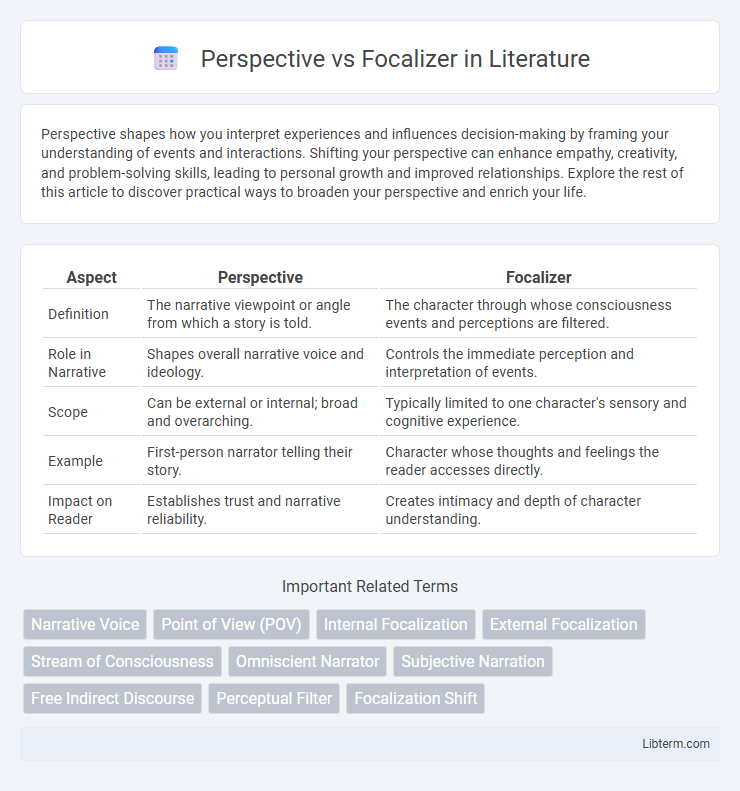Perspective shapes how you interpret experiences and influences decision-making by framing your understanding of events and interactions. Shifting your perspective can enhance empathy, creativity, and problem-solving skills, leading to personal growth and improved relationships. Explore the rest of this article to discover practical ways to broaden your perspective and enrich your life.
Table of Comparison
| Aspect | Perspective | Focalizer |
|---|---|---|
| Definition | The narrative viewpoint or angle from which a story is told. | The character through whose consciousness events and perceptions are filtered. |
| Role in Narrative | Shapes overall narrative voice and ideology. | Controls the immediate perception and interpretation of events. |
| Scope | Can be external or internal; broad and overarching. | Typically limited to one character's sensory and cognitive experience. |
| Example | First-person narrator telling their story. | Character whose thoughts and feelings the reader accesses directly. |
| Impact on Reader | Establishes trust and narrative reliability. | Creates intimacy and depth of character understanding. |
Defining Perspective in Narrative
Perspective in narrative defines the viewpoint through which the story is conveyed, shaping the reader's interpretation of events and characters. It encompasses the narrator's position and the angle of vision, influencing tone, bias, and the depth of insight available. Unlike the focalizer, who filters the narrative through specific character consciousness, perspective establishes the overarching lens that frames the entire storytelling experience.
What is a Focalizer?
A focalizer is the character or entity through whose perspective the narrative is experienced, shaping how events, emotions, and settings are perceived within a story. Unlike the narrator who tells the story, the focalizer filters information and interpretation, providing subjective insights that influence readers' understanding. Recognizing the focalizer is essential for analyzing narrative point of view and the construction of meaning in literary works.
Perspective vs Focalizer: Key Differences
Perspective and focalizer differ primarily in narrative function and scope; perspective refers to the broader viewpoint or angle from which a story is told, encompassing the narrator's overall stance and knowledge, while the focalizer specifically controls the flow of information by filtering events through a particular character's perceptions and emotions. Perspective shapes the narrative world and influences reader interpretation by establishing distance and reliability, whereas the focalizer narrows the narrative focus to characters' internal experiences, providing depth and immediacy. Understanding these distinctions enhances literary analysis by clarifying how narratives manage information and shape audience engagement.
The Role of Perspective in Storytelling
Perspective shapes the narrative by determining whose viewpoint informs the story's events, influencing how readers interpret characters and plot developments. The focalizer acts as the lens through which the narrative is filtered, providing insight into emotions, motivations, and biases that shape the storytelling experience. Mastering the interplay between perspective and focalizer enhances thematic depth and reader engagement by aligning narrative voice with character psychology.
Functions of the Focalizer in Narratives
The focalizer in narratives functions as the lens through which the story's events, characters, and settings are perceived and interpreted, shaping the reader's understanding and emotional engagement. It controls the flow of information, revealing or withholding thoughts, feelings, and perceptions, thereby influencing narrative reliability and bias. By centralizing subjective experience, the focalizer helps construct a coherent and immersive narrative perspective that aligns the audience with a particular character's viewpoint or an external observer's angle.
Narrative Voice vs Focalization
Narrative voice conveys the storyteller's distinct presence and attitude, shaping how the story is told, while focalization refers to the perspective through which events and characters are perceived within the narrative. Perspective often aligns with the narrator's stance and reliability, whereas focalization emphasizes the viewpoint and sensory experience of a particular character or entity. Understanding the distinction between narrative voice and focalization is crucial for analyzing how meaning and emotional depth are constructed in literary texts.
Examples of Perspective in Literature
Perspective in literature shapes the reader's understanding through the narrator's point of view, as seen in Harper Lee's "To Kill a Mockingbird," where Scout's childlike perspective influences the narrative tone and moral judgments. In James Joyce's "Ulysses," stream of consciousness provides intimate access to characters' thoughts, highlighting subjective perspectives that differ from external focalization. William Faulkner's "The Sound and the Fury" uses multiple perspectives to present varied, conflicting viewpoints that deepen the story's complexity and emotional impact.
Focalization Illustrated: Literary Examples
Focalization in literature describes the lens through which a narrative is perceived, aligning the story's viewpoint with a specific character's thoughts, emotions, or sensory experiences. In "The Great Gatsby," F. Scott Fitzgerald employs focalization through Nick Carraway, whose personal perceptions and judgments shape the reader's understanding of Gatsby and other characters. Similarly, in Henry James's "The Turn of the Screw," focalization is maintained through the governess's perspective, intensifying ambiguity and psychological tension by limiting the narrative to her interpretations.
Impact on Reader Experience
Perspective shapes the overall narrative viewpoint, influencing how readers perceive the story world and characters, while the focalizer directs attention to specific internal experiences and thoughts within that viewpoint, creating intimacy and depth. The interplay between perspective and focalizer determines the degree of reliability and emotional engagement, impacting how readers interpret events and connect with characters. By manipulating focalization, authors can guide readers' empathy, suspense, and comprehension, enhancing the immersive quality of the narrative.
Choosing Between Perspective and Focalizer
Choosing between perspective and focalizer depends on narrative intent and the desired depth of character experience. Perspective offers an overarching viewpoint that shapes the story's thematic scope, while focalizer narrows attention to a specific character's immediate perceptions and emotions. Selecting the appropriate narrative lens enhances reader engagement by aligning storytelling techniques with the psychological or thematic focus of the narrative.
Perspective Infographic

 libterm.com
libterm.com